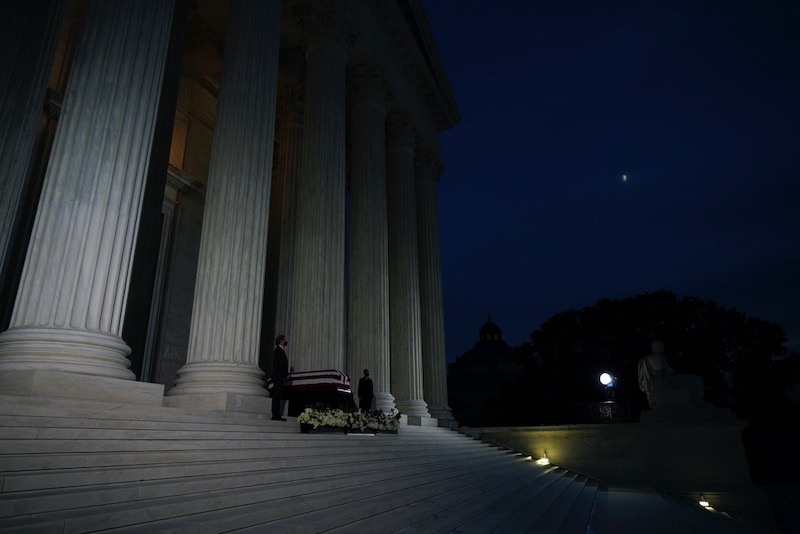Supreme Court Justice Ruth Bader Ginsburg died last week at the age of 87 from complications related to pancreatic cancer. Only the second woman to be nominated to the nation’s highest court, Ginsburg had become a liberal icon over the years, with fiery dissents as the court shifted to the right and a documentary about her life launched her into pop culture as “the notorious RBG”.
Ginsburg was known for her long years of advocacy for gender equality, both on the court and in her prior career. In 1980, President Jimmy Carter nominated Ginsburg to the Court of Appeals for the D.C. Circuit, and in 1993, President Bill Clinton nominated her to the Supreme Court. She was confirmed by the Senate on a vote of 96-3.
Sr Simone Campbell, founder of the progressive lobbying group NETWORK, mourned Ginsburg’s death, saying, “We have lost a titan for justice who has been an inspiration to NETWORK’s community of Catholic advocates. Ruth Bader Ginsburg was a pioneer for women and a champion for the equally sacred issues of civil rights, workers’ rights, immigrant rights, LGBTQ equality, and racial justice.”
The pro-life group Americans United for Life praised Ginsburg’s commitment to women’s rights but added: “Future generations will not smile on the culture of indifference toward human life that Justice Ginsburg perpetuated [for] women who deserve better ... Abortion doesn’t contribute to women’s happiness, and abortion isn’t necessary for women to succeed.”
Her death creates a vacancy on the court, scrambling the presidential election and setting off a fierce power struggle in the halls of Congress. Democratic candidate Joe Biden has been largely avoiding neuralgic, culture war issues in the campaign, but Ginsburg’s death placed the politics of abortion and the courts back in the spotlight.
In a speech honouring Ginsburg, however, Biden focused not on abortion politics but on defending the Affordable Care Act, the landmark 2009 law extending health insurance to millions of Americans. “In the middle of the worst global health crisis in living memory, Donald Trump is at the Supreme Court trying to strip health coverage away from tens of millions of families and to strip away the peace of mind from more than 100 million people with pre-existing conditions,” Biden said.
President Trump said he would nominate a woman to fill Ginsburg’s seat and the two most frequently mentioned as potential nominees are both Roman Catholics. Judge Amy Coney Barrett was nominated by Trump to serve on the 7th Circuit Court of Appeals in 2017. A former law professor at the University of Notre Dame, Barrett’s nomination would face headwinds in part because of her membership in a charismatic group called “People of Praise” which served as inspiration for the TV series “The Handmaid’s Tale”.
Judge Barbara Lagoa was the first Hispanic woman to serve on the Florida Supreme Court and was appointed by Trump to serve on the 11th Circuit Court of Appeals last year. Her nomination secured rare bipartisan support, as she was confirmed on a vote of 80-15.
Whomever Trump nominates may not secure a Senate vote at all. In 2016, when conservative Justice Antonin Scalia died in February, the Senate Majority Leader refused to give a hearing or a vote to President Obama’s nominee, saying the American people should have a say in the matter in that year’s presidential election. Now, with only weeks, not months, to go until the election, Mitch McConnell has pledged to proceed with a confirmation hearing and vote. However, two Republican Senators, Lisa Murkowski and Susan Collins, have already indicated they do not support a vote before the election.



 Loading ...
Loading ...